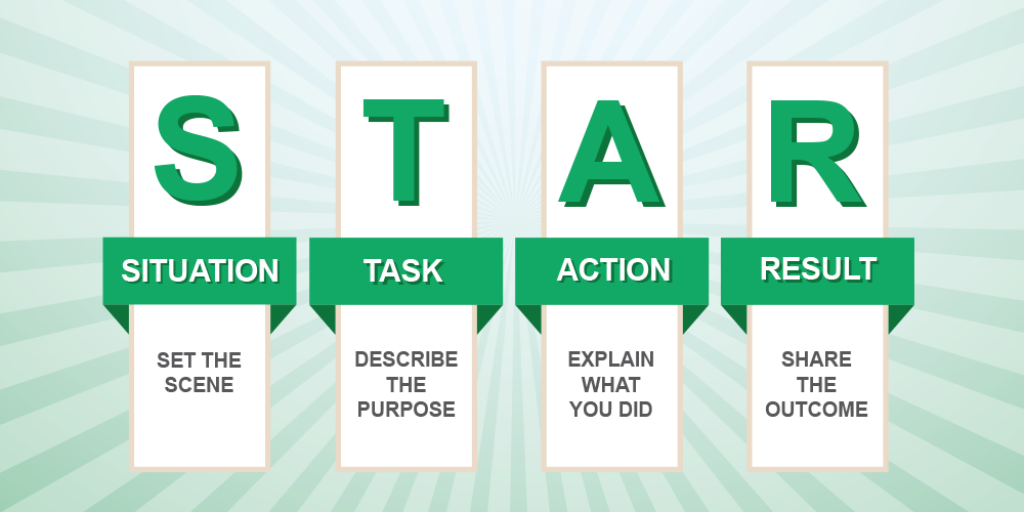In behavioral interview questions, the aim of employer or Human Resources Specialist or authority is to learn how you act while you come across with a bad situation or you have a problem in your workplace. So, your aim should be to come through successfully these questions.
The real aim is to learn your past experiences, and to predict how you will behave in the future. By giving examples from your past experiences, you can express yourself and your interlocutor can be satisfied with your answers.
Techniques for Answering Behavioral Interview Questions

Star Technique is the most useful strategy to answer behavioral interview questions. You can use this technique while you are in a job interview. You can prepare with it. It can be your anecdote. There are totally four steps to answer these questions:
- (S) Situation: Firstly, you should describe the event or situation that you were in. You should use short and clear sentences. You shouldn’t give places unnecessary information in your speaking.
- (T) Task: Secondly, you must explain the task you had to complete. If you had any problem while you are making your task, you can also describe it.
- (A) Action: Thirdly, you should describe the specific actions you took to complete the task. You should describe how you solved your problem.
- (R) Results: Finally, you should close with the result of your efforts. If you complete your task with improving your company’s sales record, resolving a conflict or completing a task, you should also express it. Especially you should focus on how your actions resulted in a success for the company.
Tips for Answering Behavioral Interview Questions
- Take your time: While you are answering the questions, you should be relaxing. Firstly, you may take a breath or a sip of water or simply pause. So, you can have little more time to think your response.
- Prepare ahead of time: You should review common behavioral interview questions ahead of time and practice your answers.
- Follow the STAR technique: You should be sure to answer any questions using the STAR technique described above. If you follow these four steps, you can be sure that you gave the best answers.
- Be positive: While you are giving answers to behavioral interview questions maybe you are negative. But it is wrong. Even if you are describing a problem r a failure at work, you should be in positive mood. And you should shift to describing how you solved the problem and positive results.
Collective Behavioral Interview Questions
These are collective behavioral interview questions. After you read them, answer each of them. You can follow STAR Technique. By answering them, you can be ready to such questions in your job interviews.
- Give an example of an occasion when you used logic to solve a problem.
- Describe a stressful situation at work and how you handled it.
- Tell me about how you worked effectively under pressure.
- How do you handle a challenge?
- Have you been in a situation where you didn’t have enough work to do?
- Have you ever made a mistake? How did you handle it?
- Describe a decision you made that was unpopular and how you handled implementing it.
- Did you ever make a risky decision? Why? How did you handle it?
- Did you ever postpone planning? Why?
- Have you ever dealt with company policy you weren’t in agreement with? How?
- Have you gone above and beyond the call of duty? If so, how?
- When you worked on multiple projects how did you prioritize?
- How did you handle meeting a tight deadline?
- Give an example of how you set goals and achieve them.
- Did you ever not meet your goals? Why?
- What do you do when your schedule is interrupted? Give an example of how you handle it.
- Have you had to convince a team to work on a project they weren’t thrilled about? How did you do it?
- Give an example of how you’ve worked on a team.
- Have you handled a difficult situation with a co-worker? How?
- What do you do if you disagree with a co-worker?
- Share an example of how you were able to motivate employees or co-workers.
- Do you listen? Give an example of when you did or when you didn’t listen.
- Have you handled a difficult situation with a supervisor? How?
- Have you handled a difficult situation with another department? How?
- Have you handled a difficult situation with a client or vendor? How?
- What do you do if you disagree with your boss?





